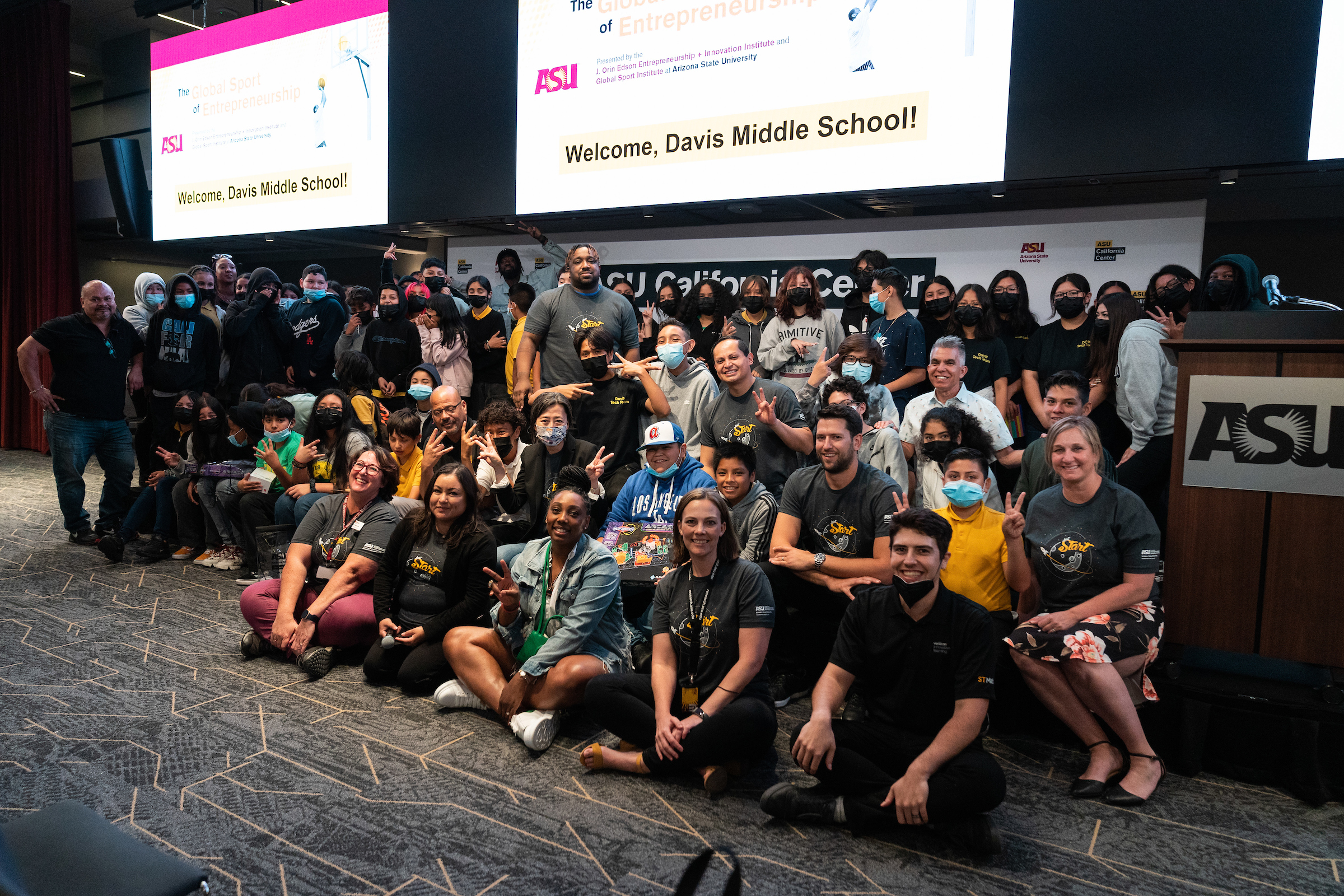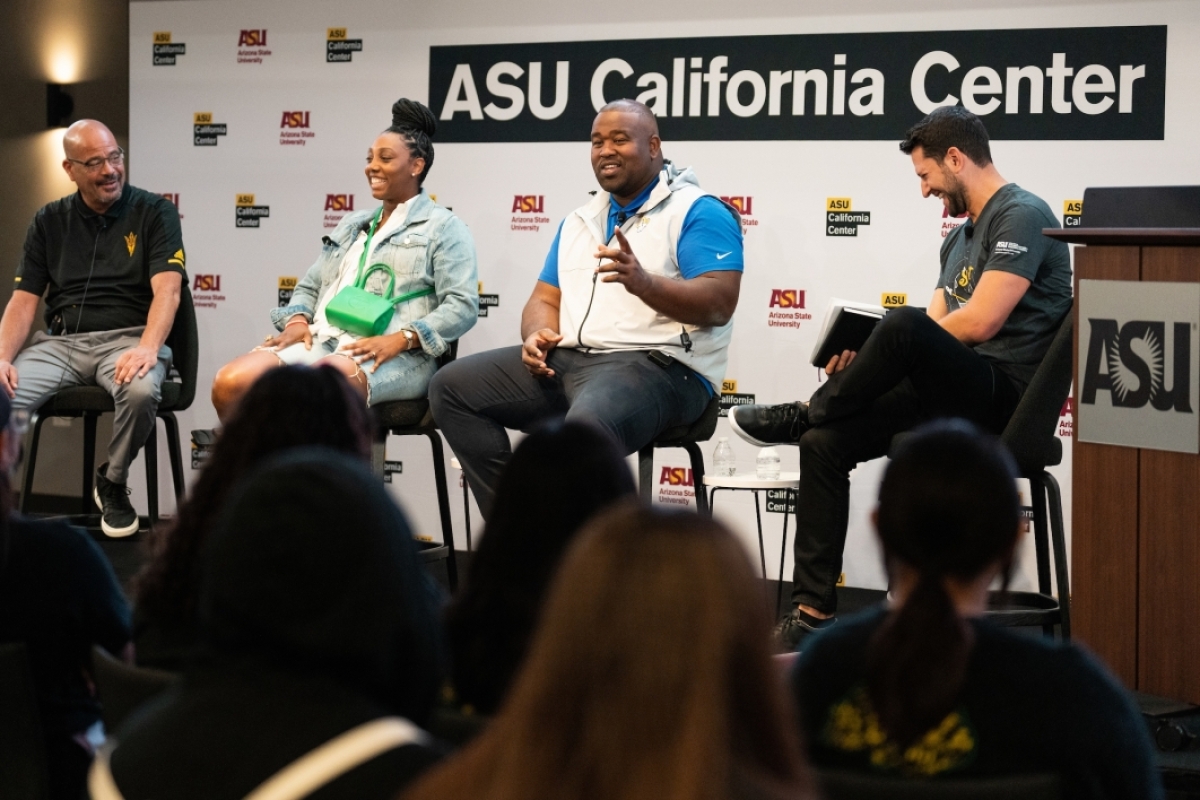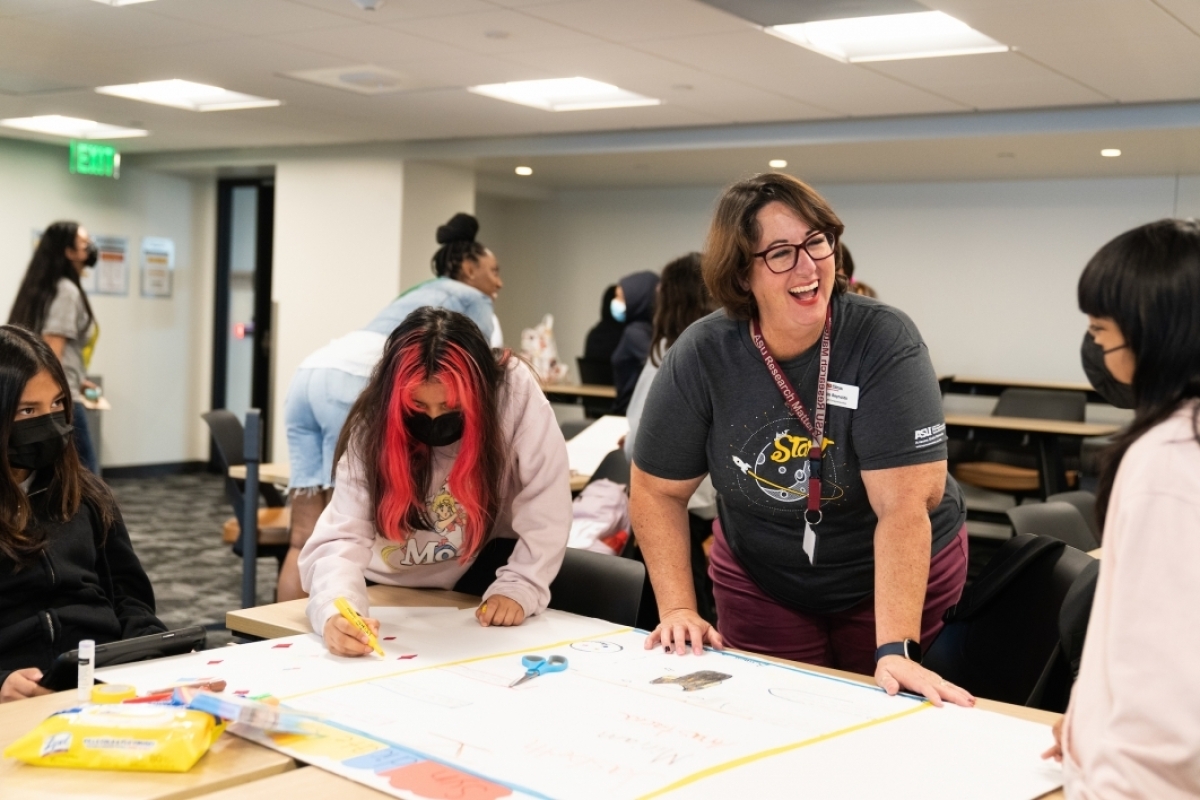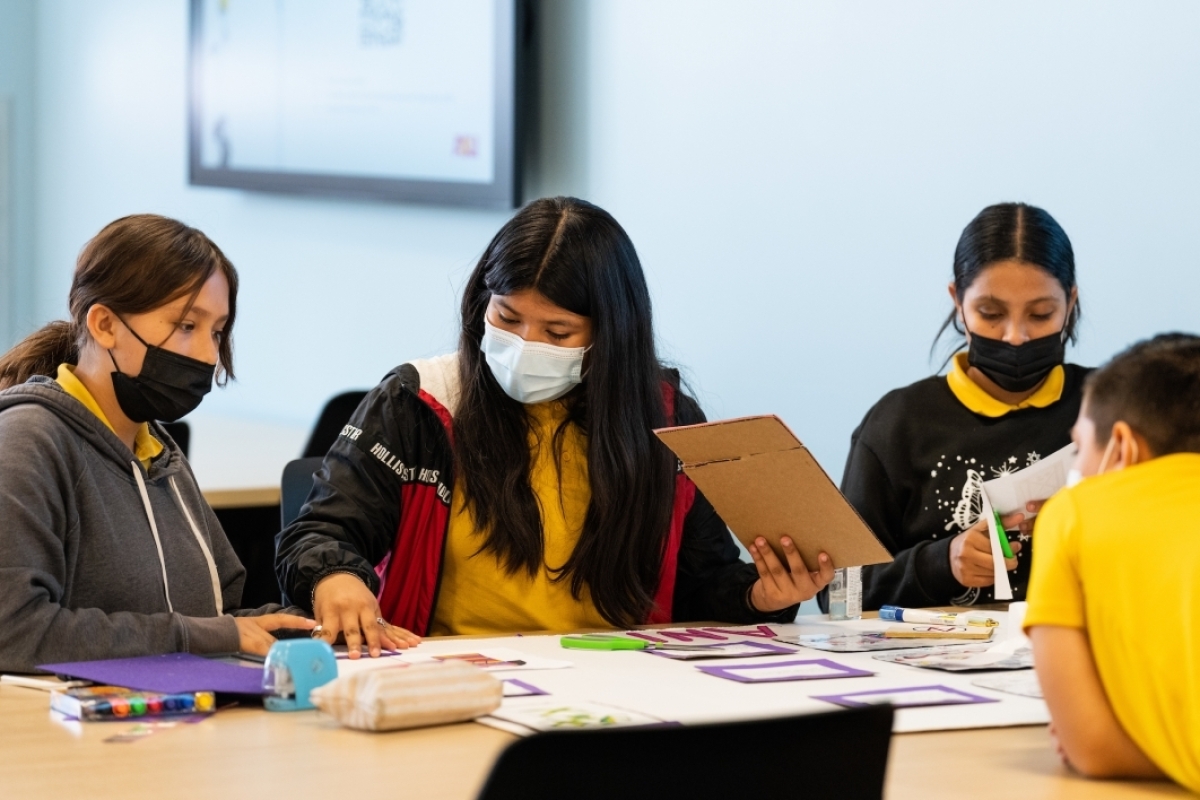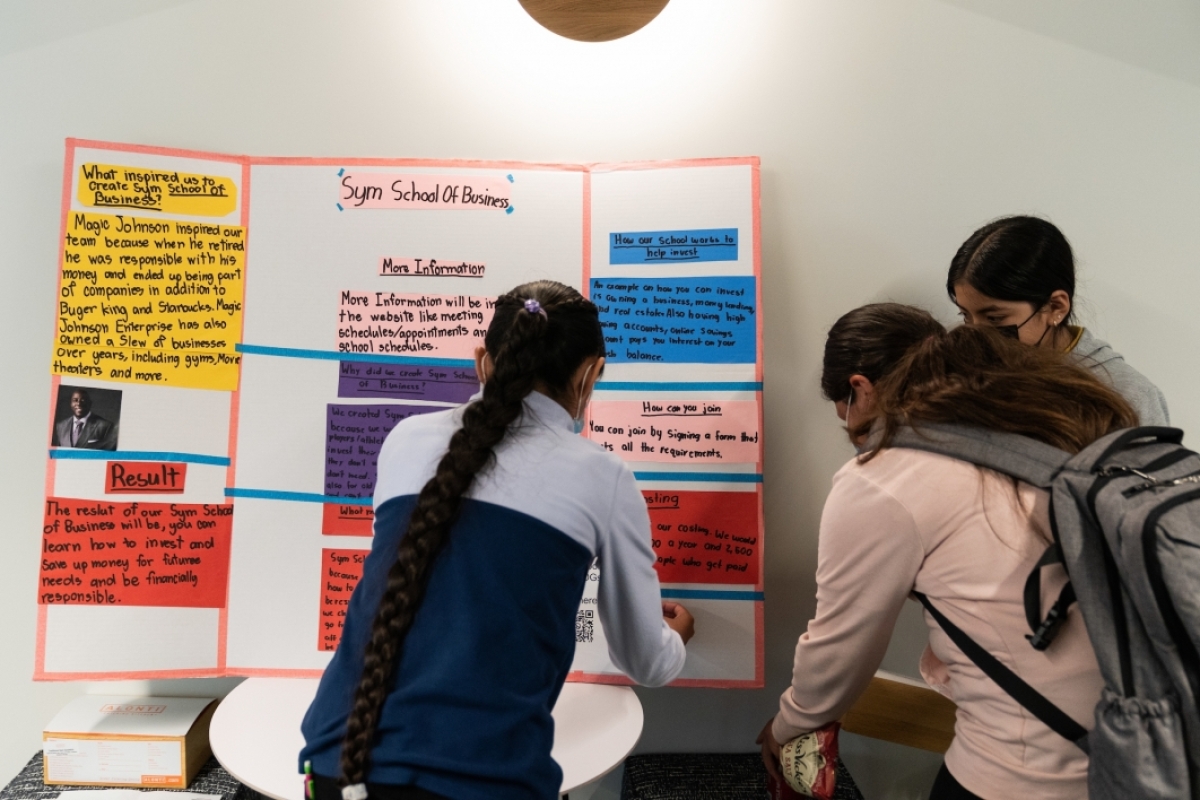Middle school students find inspiration in sports, entrepreneurship at ASU California Center
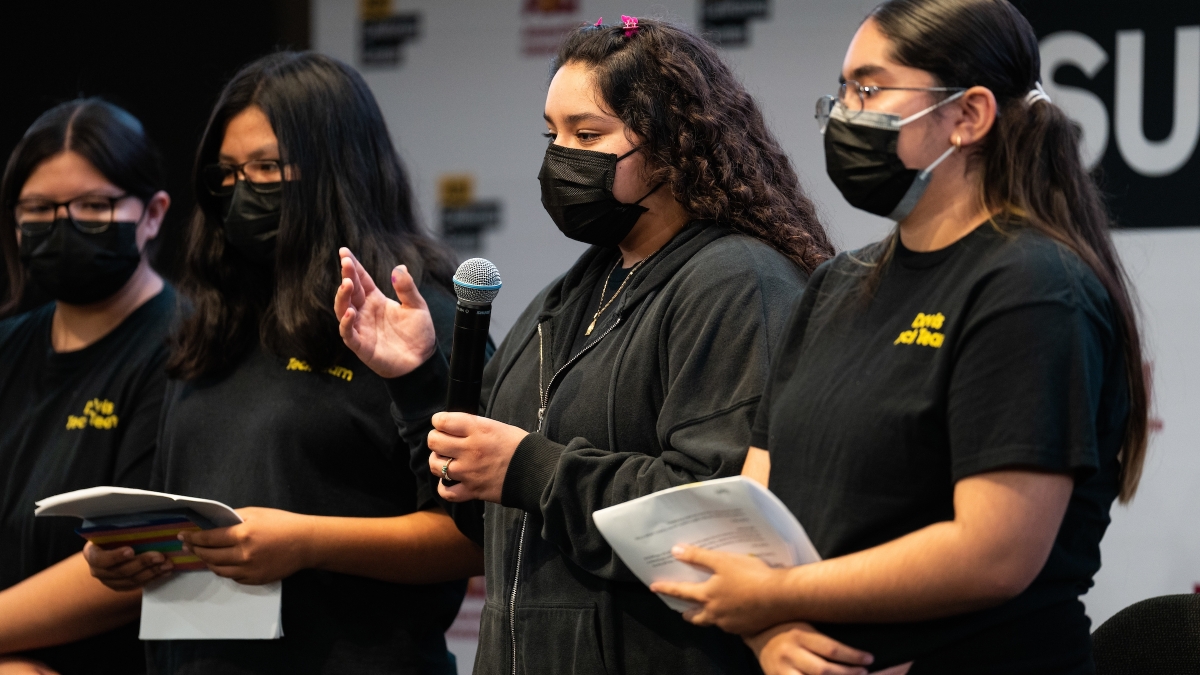
Making a career in sports isn’t always reliant on one’s ability to sink a three-pointer or sprint 100 yards in 10 seconds.
This summer, a group of middle school students received insight and hands-on learning about the variety of sports careers from industry insiders at an event at Arizona State University’s California Center, located in the historic Herald Examiner building in downtown Los Angeles.
At a panel titled “Making Moves Beyond the Game,” students from Davis Middle School in Compton, California, heard from industry experts about how innovation and creativity aid their careers and the importance of outside-the-box thinking in the world of sport. Panelists included Shea Dawson of Overtime, a sports league that provides a pathway for young athletes to accelerate their professional careers; Jacques McClendon of the NFL’s Los Angeles Rams; and Alonzo Jones of Sun Devil Athletics at ASU.
Davis Middle School is part of the Verizon Innovative Learning program, which provides students with access to the technology and skills needed for success in today’s digital economy. The initiative is made possible by Verizon through a partnership with ASU's J. Orin Edson Entrepreneurship + Innovation Institute that provides schools like Davis with technology, curriculum and training to deliver STEM education.
The panel was part of “The Global Sport of Entrepreneurship” event, co-hosted by the Global Sport Institute and the J. Orin Edson Entrepreneurship + Innovation Institute on June 6.
Davis Middle School students celebrate an enjoyable day of pitches and learning with the Global Sport Institute and Edson Entrepreneurship + Innovation Institute at the ASU California Center. Photo by Lauren Justice
After the panel, Davis students then used the direction they heard throughout the morning to develop business ideas, prototypes and solutions related to the intersection of sport and entrepreneurship to then pitch to a panel of judges.
Jose Gonzalez, a teacher at Davis, said he saw an improvement in students’ confidence after the experience.
“I think giving our students an opportunity to work and collaborate together outside the classroom with professionals and adults was very exciting for them,” he said. “I now see a difference across the classrooms — there’s more collaboration and project-based learning.”
With support from Davis Middle School’s Principal Patrick Sullivan, students spent the whole day at the event.
Davis is a Title I school, meaning 40% or more of enrolled students come from low-income families. For some students, the panel was an eye-opening look at a world of possibilities within the sports industry.
“I didn’t know you didn’t have to be an athlete to be in the sports industry,” one student said.
Likewise, the panel of judges and ASU staff on-site found the students’ pitches to be equally insightful.
“They really rose to the occasion,” said Sabrina Sue Le, program manager for the J. Orin Edson Entrepreneurship + Innovation Institute’s youth entrepreneurship team. “For them to voice what their community needs based on their own interests and experience was very impressive.”
The event was the first of two 2022 joint sessions from the Global Sport Institute and the Edson Entrepreneurship + Innovation Institute at the ASU California Center, continuing a partnership that leverages the latter's resources and dedication to innovating across industry with the former’s deep understanding and network in the world of sport.
“We were so happy to be in person with students from Davis Middle School at the ASU California Center. Partnering with the Global Sport Institute and Sun Devil Athletics to bring inspiring guest speakers Shea Dawson, Jacques McClendon and Alonzo Jones, along with a hands-on session for the students was so energizing for us all," said Ji Mi Choi, vice president of Knowledge Enterprise at ASU and founding executive director of the Edson Entrepreneurship + Innovation Institute. While it was a field trip for the students, it was a field trip for us too — and a real welcome opportunity to work alongside future entrepreneurial leaders,”
“Sport can be an exciting and engaging platform for innovation, and this recent activation between the Global Sport Institute, the Edson E+I and Davis Middle School was no exception,” said Jeff Kunowski, associate director of innovation programs at the Global Sport Institute.
“The creativity, ingenuity and resourcefulness of these students far exceeded my expectations. The concepts and prototypes were impressive, but I was truly inspired by the courage on display while these students presented their projects to a room full of adults and peers. It was a rewarding experience and I look forward to future collaborations,” he said.
As ASU lays a foundation in Southern California, local students were given perspective from inside sport on the growing business and intense passion that can be found on and off of the field. Students were encouraged to think about the next important changes happening in sport and how their ideas could fit into what might matter to fans and other stakeholders in the coming years.
“The sophistication of these students was impressive,” said Karina Bohn, chief operating officer at the Global Sport Institute. “Each of the teams knew how to call upon the skills of others within their group when talking about their projects. From sustainability to artistic expression to equity and inclusion, the young people who will become our next generation of sports thinkers wowed me with their thoughtfulness and unique ideas. It’s refreshing to know we are in good hands with the future generation.”
The Global Sport Institute and the Edson Entrepreneurship + Innovation Institute will be back at the California Center in September for another kickoff event centered on exploring how innovation and tech can continue to increase access to sport and play around the world.
Top photo: A group of Davis Middle School students share their pitch onstage at the ASU California Center.
More Business and entrepreneurship

Honoring 2 decades of entrepreneurial impact on a global scale
Thunderbird for Good, the impact-driven initiative of Thunderbird School of Global Management at Arizona State University, is marking two decades of educational programs and initiatives dedicated to…

ASU and GoDaddy launch Student Athlete Venture Studio
In a groundbreaking initiative aimed at empowering college athletes beyond their playing careers, Arizona State University and GoDaddy teamed up to launch the first-of-its-kind Student Athlete…

Boosting entrepreneurship to meet the market's needs
America loves an entrepreneur — the home run king of all businesspeople.And at Arizona State University, we love them, too.Here’s a look at how ASU prepares business students, alumni, development…


